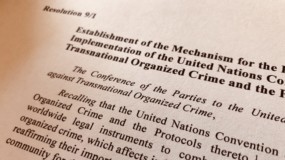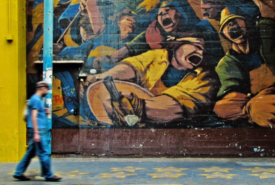Posted on 06 Feb 2018
Organized crime is a fairly new and foggy issue in the field of UN peace operations (even though scholars have increasingly recognized the importance of criminal agendas in post-conflict politics). This is despite the fact that three-quarters of current UN missions operate in environments that are greatly affected by organized crime.
Many armed groups resort to illicit activities to finance their campaigns. Organized crime also drives instability when it penetrates or co-opts state institutions. A growing body of literature suggests that peace operations may not always be the enemy of organized crime, which can in fact benefit from the stability that operations bring, and from the business opportunities – both licit and illicit – that sanction regimes provide. Peacekeepers themselves are also not immune to corruption.
Furthermore, organized crime and trafficking are most often seen in terms of their relation to terrorism, which is not always helpful for developing holistic approaches to the problem during peace operations.
The UN Multidimensional Integrated Stabilization Mission in Mali (MINUSMA) is a case in point. When authorizing the mission in 2013, the Security Council foresaw the ‘serious threats posed by transnational organized crime in the Sahel region, and its increasing links, in some cases, with terrorism’, and emphasized the urgent need to address these issues. The council did not give any specific guidance, however, to the UN mission on how to combat this problem, which the secretary general increasingly speaks out on in his periodic reports on Mali.
Three years into the mission, Resolution 2295 (2016) authorized a more ‘proactive and robust posture’ in an attempt to prevent asymmetric attacks. However, it did not give any specific instructions to MINUSMA on how to approach trafficking in weapons, drugs and humans, which have been linked to terrorist networks. Instead, the Security Council delegated the issue of organized crime to the little-resourced independent panel of experts, which it mandated to monitor the new sanctions regime for Mali created in 2017.
This case reflects the disconnect between the growing recognition by the UN System that transnational organized crime cannot be ignored by peace operations and the fact that the UN System and member states are uncertain about how to approach the issue.
In 2010 the Security Council recognized that organized crime poses serious threats to stability in post-conflict countries and invited the secretary general to consider these threats in their mission planning and reporting.. But, despite this, less than half of the current peace operations have mandates explicitly related to organized crime, fewer have mandates to tackle criminal groups directly, and those that do are ill-prepared in terms of policy, doctrine, guidance and capacity.
Peace operations have been largely ‘flying blind’ when it comes to organized crime. One limitation is that operations have not been mandated to ‘address the nexus between organized crime and national political or power dynamics, which increasingly constitute the driving force behind instability in various regions’. Although organized crime is obviously a challenge that extends far beyond the lifetime of a peace operation, failing to address the problem from the outset risks making it even more difficult to deal with later on, when it has penetrated the very state institutions the UN seeks to strengthen.
Some of the more innovative UN approaches to organized crime have come from its regional offices. The West Africa Coastal Initiative, for example, has been praised for its regional approach, which combines a political element – encouraging political will to deal with the issue among regional heads of state – and an operational element, consisting of building units to combat transnational organized crime in Sierra Leone, Liberia, Côte d’Ivoire, Guinea-Bissau and Guinea.
However, most peace operations are constrained geographically and by their time frames, which curtails their ability to adopt effective longer-term strategies against transnational organized crime. Resources, tools and expertise available to peacekeepers in critical areas, such as criminal intelligence and political economy analysis, are also limited.
In light of these challenges, and the absence of strategic guidance on the part of the UN, the UN Police Division has taken the lead in promoting a law-enforcement, capacity-building approach to organized crime. Its February 2014 policy document explained that ‘addressing organized crime … is an important entry point for engaging with national authorities to take action’. The 2016 external review of the UN Police Division also suggested that a better evaluation of organized crime at headquarters was needed to help support field missions. In an unprecedented move, the UN Police Division created for MINUSMA a unit to tackle organized crime consisting of more than 20 officers dedicated to supporting the Malian authorities with training and equipment.
The way forward: Holistic, broader responses
UN peace operations must now consolidate these law-enforcement-based police efforts with a broader approach across the UN System if they are to address organized crime effectively.
Peace operations need to develop a better understanding of the issue and its impacts, with support from the UN Office on Drugs and Crime, INTERPOL and non-governmental actors, such as the Global Initiative. Operations must also partner with development actors to mitigate factors that bolster trafficking, rather than pursue the elusive goal of countering organized crime through the G5 Sahel joint force, for instance. It also means adopting crime-sensitive approaches and adapting traditional UN tools, such as mediation, if the UN is to deal more effectively with criminal agendas.
Recent research by the UN University suggests peace operations should adopt a more holistic crime-proofing, peacemaking approach to protect electoral processes from penetration by criminal financiers and tailor sanctions to address the connections between crime and politics. At the very least, peace operations should improve risk management and due diligence to avoid feeding the beast of organized crime.
These developments need to be accompanied by broader strategic thinking – in terms of political economy, corruption in state institutions and the political will of host government – to ensure that efforts are not in vain. Granted, not every peace operation deployed in an environment affected by organized crime needs to make the issue a top priority, and a UN mission can never tackle the issue alone. But whether and how to tackle organized crime, and who the partners should be, are decisions that should be based on informed analysis.
This article draws from the forthcoming book chapter ‘Peace operations and organized crime: Still foggy?’ in Peace Operations in a Changing World edited by Cedric de Coning and Mateja Peter, Palgrave Macmillan.



